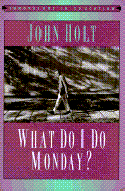|
If you are unable to see the blue navigation
buttons below, go to Contents for text links.

| |
 |
Innovators in Education Series,
edited by Susannah Sheffer
The following books were out-of-print and reissued because of their
historical significance and their relevance to today's education issues.
They represent important developments in educational thought and have an
ongoing contemporary application. Unfortunately, several have gone out of
print again, or are hard to find, and we just have a few copies left.
 How to Survive in Your Native Land by James
Herndon. From Susannah Sheffer's foreword to the new edition: "I envy anyone who
is about to read this book for the first time. I remember discovering it in a
bookstore and then reading it on a train, hardly able to keep from turning to
the next passenger to say, 'Listen to this!' Instead, I copied passages out and
later stuck them above my desk where they hung like beacons, reminding me of
what I knew was true, what Herndon helped me to see....This is a book about
teaching school, but on a deeper level it's about figuring out how to live, how
to go on working in the best way you can." How to Survive in Your Native Land by James
Herndon. From Susannah Sheffer's foreword to the new edition: "I envy anyone who
is about to read this book for the first time. I remember discovering it in a
bookstore and then reading it on a train, hardly able to keep from turning to
the next passenger to say, 'Listen to this!' Instead, I copied passages out and
later stuck them above my desk where they hung like beacons, reminding me of
what I knew was true, what Herndon helped me to see....This is a book about
teaching school, but on a deeper level it's about figuring out how to live, how
to go on working in the best way you can."
Paper, 192 pages. 1997 edition.
#4087 $13.95 
 |
 The Naked Children by Daniel
Fader.
This is the story of teacher Daniel Fader's and his relationship with five
students in an inner city junior high school. The year is 1965. Fader tells us how he learned from
his students and because of his insight and storytelling ability, we too gain
insight from what he
learned and, like Fader, be changed by it. The Naked Children by Daniel
Fader.
This is the story of teacher Daniel Fader's and his relationship with five
students in an inner city junior high school. The year is 1965. Fader tells us how he learned from
his students and because of his insight and storytelling ability, we too gain
insight from what he
learned and, like Fader, be changed by it.
Wentworth, who reads Born Free aloud to his friends, but pretends in
school that he can't read--and succeeds so well that his teachers consider him
hopelessly illiterate . . . Cleo, the "bad girl" leader of a gang, who develops
a rehabilitation program for a fourteen-year old alcoholic pool hustler . . .
Snapper, bright and alert enough to rescue a student suffering an epileptic
seizure but who has difficulty responding to the simplest classroom questions.
These are the naked children.
During this year, Fader discovers that children hide themselves and their minds
from school and that schools often fail to truly know their students. For many
students, school is a boring, humiliating, and frightening experience that is
disconnected from the lives they live. The lessons he learned then still apply
directly to what doesn't work and what could work in today's school."
"[These children] and others developed a special formula for
survival: 'It's smart to play dumb.' Meet them and the man who taught and
learned from them in one of the most inspiring books about ghetto life." -
Library Journal.
Paper, 237 pages. 1996 edition. Originally written in 1971. #3978 $14.95

 |
 Uptaught
by Ken Macrorie (Innovator's in Education Series) - In this passionate book, Ken Macrorie - an English teacher - lays the blame for classroom dissatisfaction on
the faculty, epitomized by Percival the computer, blind electronic enforcer of
the academic cliches. Percival asks students to express something worthwhile
then denies them a true voice in which to say it. He functions well in the
university, dedicated to the free pursuit of truth and organized to
systematically prevent it. Macrorie, once a Percival himself, writes with
perception and humor of his own frustrating voyage out of darkness. He admits
the feeling of power that came when he discovered the key to what he calls "The
Third Way" of teaching, a path toward mutual respect and instructive dialogue. Uptaught
by Ken Macrorie (Innovator's in Education Series) - In this passionate book, Ken Macrorie - an English teacher - lays the blame for classroom dissatisfaction on
the faculty, epitomized by Percival the computer, blind electronic enforcer of
the academic cliches. Percival asks students to express something worthwhile
then denies them a true voice in which to say it. He functions well in the
university, dedicated to the free pursuit of truth and organized to
systematically prevent it. Macrorie, once a Percival himself, writes with
perception and humor of his own frustrating voyage out of darkness. He admits
the feeling of power that came when he discovered the key to what he calls "The
Third Way" of teaching, a path toward mutual respect and instructive dialogue.
Originally published in 1970, Uptaught is not a historian's or a social
scientist's attempt to make sense of that roiling era, but a kind of extended
Tom Paine-like pamphlet produced by many individual students and a few teachers
who had awakened to find they could write their true voices and feelings.
"....a splendid...book about the teaching of English and particularly
writing." - John Holt
Paper, 208 pages. 8.5"x5.75"x.5".
#3964 $14.95

 |
The Way It Spozed to Be by James Herndon. We
all know what's "spozed" to happen in school, but what happens when one new
English teacher doesn't follow the rules? In Herndon's classroom, what happened
was that students began learning and caring about learning, often for the first
time. And what happened was that the teacher got fired. But Herndon's powerful
story endures; this account of a year in a ghetto is not a hook one easily
forgets. JHB
Cover has a couple of minor creases.Paper, 188 pages. 1997 edition.
#4079 $13.95

 |
 What Do I Do Monday? by
John
Holt. This is Holt's classic answer to teachers who asked, "How can I put all
your ideas into practice myself, with my kids?" The book contains hundreds of
things to do or try - "measuring speed," "measuring strength," "fractions,"
"recording talk," "writing for ourselves," "writing for others," and much more.
Also a hard-hitting look at what's wrong with marking and grading, at what can
help troubled children, and at the difference between "teacher as cop" and
"teacher as guide." Holt wrote that of all his books, he felt that this was the
one homeschoolers would find most practical. What Do I Do Monday? by
John
Holt. This is Holt's classic answer to teachers who asked, "How can I put all
your ideas into practice myself, with my kids?" The book contains hundreds of
things to do or try - "measuring speed," "measuring strength," "fractions,"
"recording talk," "writing for ourselves," "writing for others," and much more.
Also a hard-hitting look at what's wrong with marking and grading, at what can
help troubled children, and at the difference between "teacher as cop" and
"teacher as guide." Holt wrote that of all his books, he felt that this was the
one homeschoolers would find most practical.
Paper, 300 pages. 1995 edition.
#3684 $15.95
 |
|
|

